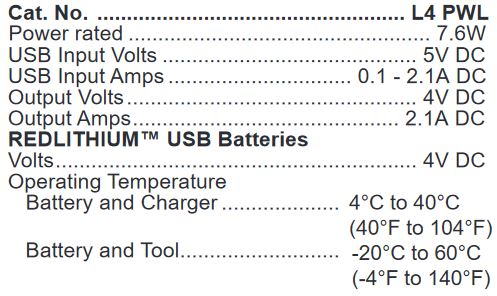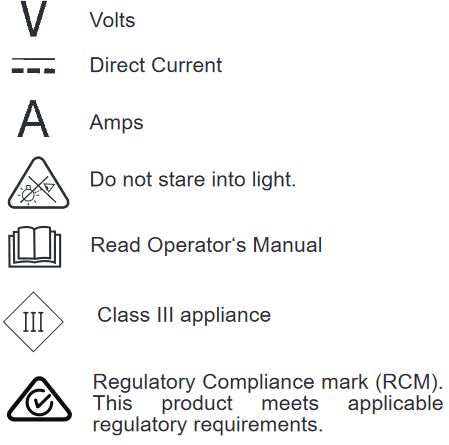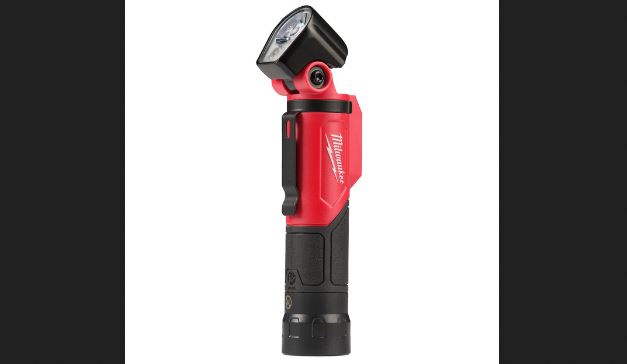Milwaukee RedLithium USB Work Light L4 PWL User Manual

IMPORTANT SAFETY INSTRUCTIONS
![]() WARNINGREAD AND UNDERSTAND ALL INSTRUCTIONS. Failure to follow all instructions listed below, may result in electric shock, fire and/or serious personal injury.
WARNINGREAD AND UNDERSTAND ALL INSTRUCTIONS. Failure to follow all instructions listed below, may result in electric shock, fire and/or serious personal injury.
SAVE THESE INSTRUCTIONS
- SAVE THESE INSTRUCTIONS – THIS MANUAL CONTAINS IMPORTANT SAFETY AND OPERATING INSTRUCTIONS FOR REDLITHIUM™ USB BATTERIES AND THE REDLITHIUM™ USB PIVOTING WORK LIGHT.
- USE AND CHARGE ONLY REDLITHIUM™ USB BATTERIES IN THIS USB RECHARGEABLE LIGHT. OTHER TYPES OF BATTERIES MAY CAUSE PERSONAL INJURY AND DAMAGE.
- BEFORE USING THE BATTERY AND LIGHT, READ THIS OPERATOR’S MANUAL AND ALL LABELS ON THE BATTERY AND LIGHT.
- AVOID DANGEROUS ENVIRONMENTS. Do not charge battery in rain, snow, damp or wet locations. Do not use battery or charger in the presence of explosive atmospheres (gaseous fumes, dust or flammable materials) because sparks may be generated when inserting or removing battery, possibly causing fire.
- CHARGE IN A WELL VENTILATED AREA. Do not allow smoking or open flames near a charging battery. Vented gases may explode.
- USE ONLY RECOMMENDED ATTACHMENTS. Use of an attachment not recommended or sold by the battery charger or battery manufacturer may result in a risk of fire, electric shock or personal injury.
- TO REDUCE THE RISK OF ELECTRIC SHOCK, always unplug charger before cleaning or maintenance.
- DO NOT BURN OR INCINERATE BATTERY PACKS. Battery may explode, causing personal injury or damage. Toxic fumes and materials are created when batteries are burned.
- DO NOT CRUSH, DROP, OR DAMAGE battery. Do not use a battery or charger that has received a sharp blow, been dropped, run over, or damaged in any way (e.g., pierced with a nail, hit with a hammer, stepped on).
- DO NOT DISASSEMBLE. Incorrect reassembly may result in the risk of electric shock, fire or exposure to battery chemicals. If it is damaged, take it to a MILWAUKEE® service facility.
- BATTERY CHEMICALS CAUSE SERIOUS BURNS. Never allow contact with skin, eyes, or mouth. If a damaged battery leaks any fluid, use rubber or neoprene gloves to dispose of it. If skin is exposed to battery fluids, wash with soap and water, and rinse with vinegar. If eyes are exposed to battery fluids, immediately flush with water for 20 minutes and seek medical attention. Remove and dispose of contaminated clothing.
- DO NOT SHORT CIRCUIT. A battery pack will short circuit if a metal object makes a connection between the positive and negative contacts on the battery pack. Do not place a battery pack near anything that may cause a short circuit, such as coins, keys or nails in your pocket. Do not allow fluids to flow into battery pack. Corrosive or conductive fluids, such as seawater, certain industrial chemicals, and bleach or bleach containing products, etc., can cause a short circuit. A short circuited battery pack may cause fire, personal injury, and product damage.
- STORE in a cool, dry place. Do not store battery where temperatures may exceed 50°C (120°F) such as in direct sunlight, a vehicle or metal building during the summer.
- TO REDUCE THE RISK OF INJURY, CLOSE SUPERVISION IS NECESSARY when an appliance is used near children.
- STORE IDLE LIGHT OUT OF REACH OF CHILDREN. Warm lights can become hazardous in the hands of children.
- KNOW YOUR LIGHT. Read this manual carefully to learn your light’s applications and limitations as well as potential hazards associated with this type of light.
- MAINTAIN LABELS AND NAMEPLATES. These carry important information. If unreadable or missing, contact a MILWAUKEE® service facility for a replacement.
READ AND SAVE ALL INSTRUCTIONS FOR FUTURE REFERENCE.
ADDITIONAL BATTERY SAFETY RULES
![]()
![]()
![]()
![]()
![]()
![]()
![]()
![]()
![]()
![]()
SPECIFICATIONS


SYMBOLOGY


BATTERY
![]()
![]()
![]()
![]()
![]()
![]()
![]()
![]()
![]()
![]()
Maintenance and Storage
Do not expose your battery or rechargeable light to water or rain, or allow them to get wet. This could damage the light and battery. Do not use oil or solvents to clean or lubricate your battery. The plastic casing will become brittle and crack, causing a risk of injury. Store batteries at room temperature away from moisture. Do not store in damp locations where corrosion of terminals may occur. As with other battery types, permanent capacity loss can result if the pack is stored for long periods of time at high temperatures (over 50°C (120° F)). MILWAUKEE® Li-Ion batteries maintain their charge during storage longer than other battery types. After about a year of storage, charge the battery as normal.
![]()
![]()
![]()
![]()
![]()
![]()
![]()
![]()
![]()
![]()
Disposing of MILWAUKEE® Li-Ion Battery
MILWAUKEE® Li-Ion batteries are more environmentally friendly than some other types of power tool batteries. Always dispose of your battery according to federal, state and local regulations. Contact a recycling agency in your area for recycling locations.
Even discharged batteries contain some energy. Before disposing, use electrical tape to cover the terminals to prevent the battery from shorting, which could cause a fire or explosion.
LIGHT
![]()
![]()
![]()
![]()
![]()
![]()
![]()
![]()
![]()
![]()
Use and charge only REDLITHIUM™ USB batteries in this USB rechargeable light. Other types of batteries may cause personal injury and damage.
Inserting the Battery
- Twist the cap and remove.
- Line up the battery with the compartment and fully insert the battery.
- Replace the cap and twist to secure.
Charging the Battery
- Plug your USB cable into a power source such as an AC wall adaptor, computer or car port. Charge rates may vary depending on the power source’s maximum output.
- Lift the rubber cover to expose the micro USB port. Insert the micro USB plug into the micro USB port.
- The indicator light will display the charging status:
Red Solid: Charging, 0-79% chargedGreen Flashing: Charging, 80-99% chargedGreen Solid: 100% ChargedRed/Green Flashing: Damaged or Faulty Battery
If the light indicator flashes red and green, check that the battery is fully seated into the bay. Remove the battery and reinsert. If the light continues to flash red and green, the battery may be extremely hot or cold, or wet. Allow the battery to cool down, warm up, or dry out and then reinsert. If the problem persists, contact a MILWAUKEE® service facility.
Operation
![]()
![]()
![]()
![]()
![]()
![]()
![]()
![]()
![]()
![]()
Press the power button to turn the light on and off. Press the MODE button to cycle through Spot, Flood High, and Flood Low. The indicator light will display the battery life:
Red Flashing: 0-3% remainingRed Solid: 3-10% remainingYellow Solid: 11-49% remainingGreen Solid: 50-100% remaining
![]()
![]()
![]()
![]()
![]()
![]()
![]()
![]()
![]()
![]()
Maintenance and Storage
![]()
![]()
![]()
![]()
![]()
![]()
![]()
![]()
![]()
![]()
Store your charger in a cool, dry place.
As a general practice, it is best to unplug battery chargers and remove batteries when not in use. No battery damage will occur, however, if the charger and battery are left plugged in.
![]()
![]()
![]()
![]()
![]()
![]()
![]()
![]()
![]()
![]()
Cleaning
Clean out dust and debris from charger vents and electrical contacts by blowing with compressed air. Use only mild soap and a damp cloth to clean the battery and charger, keeping away from all electrical contacts. Certain cleaning agents and solvents are harmful to plastics and other insulated parts. Some of these include gasoline, turpentine, lacquer thinner, paint thinner, chlorinated cleaning solvents, ammonia and household detergents containing ammonia. Never use flammable or combustible solvents around batteries, charger, or tools.
WARRANTY – AUSTRALIA and NEW ZEALAND
Please refer to Australian and New Zealand warranty supplied with tool. This warranty applies only to product sold by authorised dealers in Australia and New Zealand.
SERVICE – AUSTRALIA and NEW ZEALAND
MILWAUKEE® prides itself in producing a premium quality product that is Nothing But Heavy DutyTM. Your satisfaction with our products is very important to us! If you encounter any problems with the operation of this tool, please contact your authorised MILWAUKEE® dealer.
For a list of MILWAUKEE® dealers, guarantee or service agents please contact MILWAUKEE® Customer Service or visit our website. (Australia Toll Free Telephone Number 1300 645 928)(New Zealand Toll Free Telephone Number 0800 645 928)or visit milwaukeetool.com.au/milwaukeetool.co.nz.
Milwaukee Electric Tool Corporation13135 West Lisbon Road, Brookfield, Wisconsin U.S.A. 53005
Milwaukee Tool (Australia)21 Kelletts Road, Rowville, VIC 3178Melbourne, Australia
Milwaukee Tool (New Zealand)274 Church Street, Penrose,Auckland, 1061, New Zealand
DESIGNED BY MILWAUKEE ELECTRIC TOOL CORP.PROFESSIONALLY MADE IN CHINAPRINTED IN CHINA
961016321-01(A)
[xyz-ips snippet=”download-snippet”]

